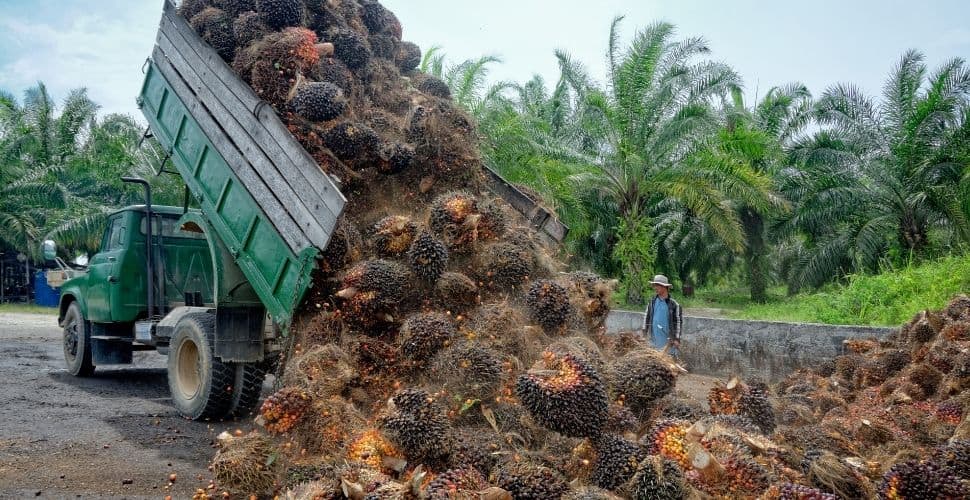From the moment you wake up and eat your breakfast to the moment you brush your teeth just before you go to bed, chances are you have consumed palm oil dozens of times. This ingredient touches almost every aspect of our lives. Unfortunately, it has been shown to be produced by workers and children trapped in modern slavery.
Sime Darby Plantation is a Malaysian corporation and is the world’s largest palm oil producer. On December 30, 2020, the U.S. Customs and Border Protection (CBP) agency banned its products from entering the country due to allegations of labor violations on its plantations and accusations of forced labor.
Abuses in the Malaysian palm oil industry are so chronic and endemic that palm oil from Malaysia is identified by the U.S. Department of Labor as a good for which there is “ reason to believe it is produced by child labor or forced labor in violation of international standards.” According to a recent article published in Al Jazeera, the company is lobbying to re-enter the U.S. market in the context of global oil shortages and tensions within the industry.
The accusations against Sime Darby
Hari Rai – who asked to use a pseudonym to avoid reprisals – is from Nepal and has worked for nine years on one of the corporation’s plantations in Malaysia. In his statements to Al Jazeera he said that when he started working, his passport was confiscated, and he witnessed multiple cases of abuse such as threats and intimidation, arbitrary sanctions, and physical abuse.
“Before, when I arrived in Malaysia, the company would hold my passport and I had no possession of it.” “I could not visit other states in Malaysia without a passport, and in order to be approved I had to have a solid reason for them to give me the passport [back].”
In response to questions from Al Jazeera, Sime Darby did not address the allegations of mistreatment on its plantations but noted that it has implemented reforms in its recruitment of foreign workers, who make up most of the company’s Malaysian workforce.
In its sustainability report, the company listed several steps it is taking or has taken to improve conditions, including improving employee housing and introducing a confidential whistleblower hotline for field worker complaints.
Sime Darby also said in the report that it had improved its process for recruiting foreign workers, in part by hiring labor consultant Andy Hall, an outspoken advocate who has worked with other Malaysian companies accused of using forced labor. Hall told Al Jazeera his work with the company prevented him from speaking on the record.
Reputational greenwashing in the face of growing demand for palm oil
For some players in the business, improvements have not come fast enough. Cargill, one of the world’s largest food companies, suspended purchases from the plantation company earlier this year. In April, Cargill publicly accused Sime Darby of a lack of transparency in dealing with labor conditions. Other well-known companies, including General Mills, Hershey and Ferrero, have also publicly ceased dealing with Sime Darby.
However, in the face of the oil supply crisis, other U.S. and European companies publicly asked for more transparency in order to resume buying palm oil from Sime Darby: the organization filed new documentation with CBP in an attempt to overturn the import ban.
In addition, as part of its series of reforms, Sime Darby recently announced an $18.6 million migrant worker compensation plan. While some human rights experts say this is a positive first step, other activists believe these piecemeal reforms are part of a reputational greenwashing.
Freedom United and our partners, Global Labor Justice – International Labor Rights Forum (GLJ-ILRF), Rainforest Action Network, and SumofUs, request that CBP consult with us as petitioners while enforcing the ban and prior to taking any steps to revoke it. We are committed to seeing concrete remedy for victims of forced labor, reimbursement of all recruitment fees imposed on migrant workers, and robust measures to protect and uphold workers’ rights that can be publicly monitored and tracked over time.
Modern slavery is connected to many of our household products through palm oil. The palm oil industry employs 3.5 million people. Many are promised high-paying work in another country, only to suffer conditions of forced labor upon arrival.
If you want to learn more to make informed decisions and commit to eradicating slave labor, join Freedom University.







Freedom United is interested in hearing from our community and welcomes relevant, informed comments, advice, and insights that advance the conversation around our campaigns and advocacy. We value inclusivity and respect within our community. To be approved, your comments should be civil.
The stupidity for money put the world in danger why humans don’t understand that
NO TO PALM OIL! Quit the destruction of natural habitats for wildlife as we don’t want to live to regret it!!